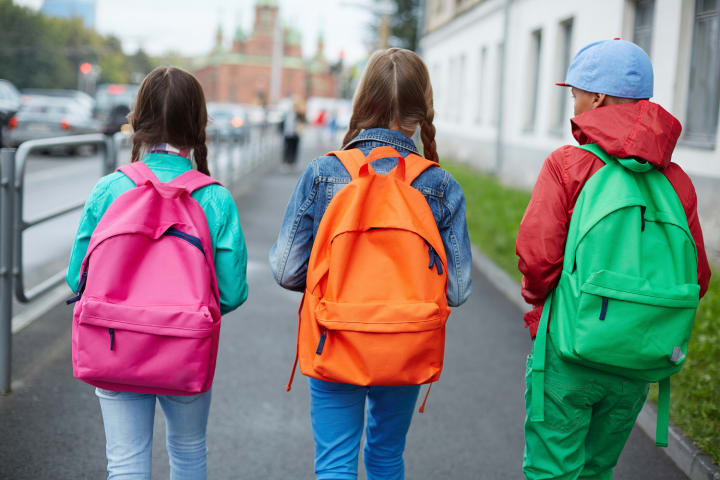Back to School in 2021
4 Tips for Better Mental Health

August is almost over, and the new 2021–2022 school year has begun. School is a major milestone in a child's social and emotional development, whether they are going for the first time, starting at a new school, or returning after a fun summer holiday.
It's natural for children to feel worried, thrilled, and apprehensive as they prepare and/or begin the new school year.
Some are eager to return to their daily routines, after-school activities, and seeing friends, while others are more apprehensive about returning in person.
When doing research I stumbled upon blogger Jen Hatmaker, who expressed how she felt as a parent, as the events of summer break began to wear her down:
"The wheels have come off, dear ones. I did my part: the fun camps, the trips, the pool, the lake, the snow cones, the Good Times, and now it is all dead to me. I've reached the outer limits of my capabilities. We need structure back. We need routine. We need kids to go the freak to bed," she said.
There are plenty of resources available online to ensure students can have a good attitude and embark on this school year with confidence, whether returning to school in-person, adopting a hybrid approach, studying online, or being home-schooled.
Experts online recently shared the following tips and tricks to hopefully help youngsters transition successfully mentally, into the new school year.
---
Establish routines and more structure
Children commonly have relaxed schedules during the summer, as can be expected.
If your child's sleep schedule is out of sync, the first few weeks of school might be a nightmare. A good suggestion may be to decide on an ideal bedtime and progressively implement it until a stable habit is formed.
Another suggestion for establishing a healthy routine includes, according to experts, allowing children to help prepare for school the night before, selecting clothes, packing healthy lunches, backpacks, etc. This helps them to feel in charge and may motivate them to do a task that would normally be considered mundane or boring.
---
Anxiety over performance and other concerns
Starting school may cause anxiety for some youngsters. Experts suggest:
- Talking about school issues if you notice symptoms of worry.
- Making time to listen when children want to chat - going over a child's concerns one by one and assist them to solve problems so they don't get overwhelmed.
- Helping youngsters understand that no one is perfect at everything and that both parents and children excel in certain areas.
- Participating in school-related activities or events and commending your child for their efforts, even if you don't notice immediate benefits.
---

Gradual Inclusion
This is a strategy that parents frequently use to acclimate their children to a new daycare, but it may also help youngsters who are terrified of school. You'll need to discuss this with your child's teacher to determine whether your school will be able to accommodate this method.
Staying with your child for part of the first few days is an example of progressive introduction. Then you progressively reduce the amount of time you spend at school with your child.
This might take one or two days for some children, while others may have to wait a few weeks. Allow your child to lead the way since each child is unique.
---
Bullying
Bullying at school is a severe problem that can lead to harm or worse in extreme situations.
If you believe your kid is being bullied, experts say you should do the following:
- Assure your youngster that both you and the instructor are on his or her side.
- Speak with your teacher or the person in charge.
- Maintain involvement in the decision-making process and follow up on any actions made. Check-in with your child on a regular basis to see how things are going.
- Keep in mind that youngsters may be hesitant to speak up for fear of being embarrassed or causing more hurt.
---
Bullying Symptoms in Children
- Clothing, books, gadgets, and jewels that have been lost or destroyed
- Injuries that cannot be explained
- Headaches or stomachaches on a regular basis, feeling ill or pretending to be ill
- Changes in eating patterns, such as missing meals unexpectedly or binge eating. Because they did not have lunch at school, children may return home famished.
- Having trouble sleeping or having frequent nightmares
- Gradually declining grades, a lack of interest in homework, or a desire to avoid going to school
- Friendships are suddenly lost, and people shun social situations.
- Feelings of powerlessness or low self-esteem
- Self-destructive actions such as fleeing from home, hurting themselves, or discussing suicide are all examples of self-destructive behaviors.
---
Seeing your child in emotional pain is one of the most challenging parenting situations. It's difficult to think clearly, and it's even more difficult to imagine that other adults would understand, care, or know what to do.
However, your child's teacher, guidance counselor, or principal has most certainly dealt with other students who have had similar problems, and most educators would naturally want to adapt, include, and support your child.
It is their responsibility to do so.
In the meantime, remember that getting back into the groove of things at school takes time. Don't forget to be easy on yourselves and give yourselves (yes, you - parents and caretakers) a break.
If you have already thought about how you will approach the school year; if you're trying to prepare to deal with life and the school year in a post-COVID world; and if you have even attempted to develop some sort of makeshift plan; then you've already won half the battle.
About the Creator
Mandilee A Hecht
Michigan Journalist since 2007. Freelance Writer and Content Creator. Wife, and mom to two very photogenic cats






Comments
There are no comments for this story
Be the first to respond and start the conversation.